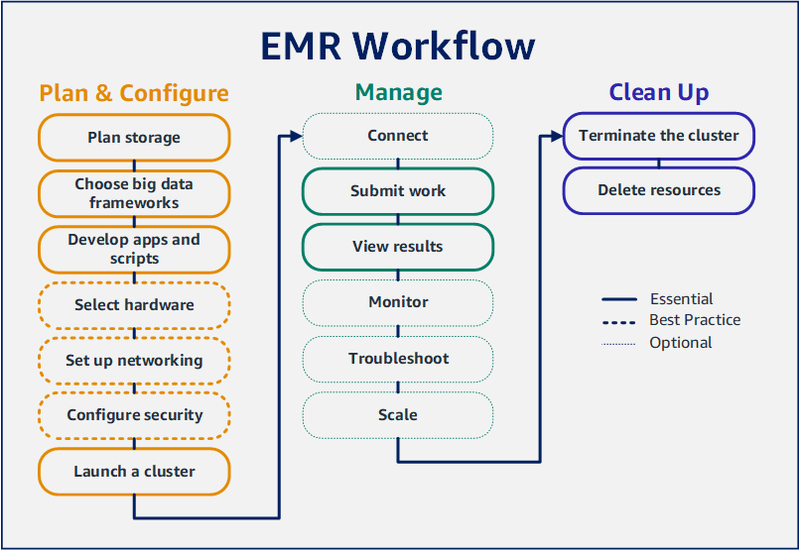
In the world of data engineering, dealing with huge amounts of information is tough. That's where AWS Elastic MapReduce (EMR) comes in – it's like a super helper for data engineers. EMR makes it way easier to work with big data by handling all the complicated stuff behind the scenes. This managed big data processing service simplifies the deployment and scaling of powerful data processing frameworks, providing an efficient and cost-effective means of handling large-scale data processing tasks.

AWS EMR WorkFlow

To launch a cluster with the new console quickly
- 1. Sign in to the AWS Management Console, and open the Amazon EMR console at https://console.aws.amazon.com/emr/clusters.
- 2. Under EMR on EC2 in the left navigation pane, choose Clusters, and then choose Create cluster.
- 3. On the Create Cluster page, enter or select values for the provided fields. The persistent summary panel displays a real-time view of your currently selected cluster options. Select a heading in the summary panel to navigate to the corresponding section and make adjustments. You must complete all required configurations before you can choose Create cluster.
- 4. Choose Create cluster to accept the configuration as shown.
- 5. The cluster details page opens. Find the cluster Status next to the cluster name. The status should change from Starting to Running to Waiting during the cluster creation process. You might need to choose the refresh icon on the upper right or refresh your browser to receive updates.
- 6. When the status changes to Waiting, your cluster is up, running, and ready to accept steps and SSH connections.

Advantages of Using AWS EMR In Your Data Engineering
Scalability and Flexibility: AWS EMR allows data engineers to scale their processing capabilities horizontally by adding or removing instances as needed. This flexibility ensures that the system can adapt to varying workloads, making it easier to handle fluctuating demands on resources. Whether processing terabytes or petabytes of data, EMR provides the scalability necessary for the challenges of big data.
Managed Infrastructure: Data Engineers benefit from AWS EMR's fully managed infrastructure, which automates the provisioning and configuration of clusters. This eliminates the need for manual intervention in setting up and maintaining hardware, allowing engineers to focus on designing and optimizing data processing workflows. This managed service significantly reduces operational overhead and accelerates time-to-insight.
Cost-Efficiency: With AWS EMR, Data Engineers can leverage a pay-as-you-go model, where resources are allocated and charged based on actual usage. This cost-effective approach allows organizations to optimize spending while ensuring that computing resources are available when needed. Additionally, the ability to use Spot Instances further enhances cost efficiency by taking advantage of surplus EC2 capacity at a lower cost.
Integration with Big Data Ecosystem: AWS EMR seamlessly integrates with a broad ecosystem of big data tools and frameworks, such as Apache Spark, Apache Hadoop, Apache Hive, and Apache HBase. This compatibility enables data engineers to choose the right tools for their specific processing needs and ensures a familiar environment for developing and running big data applications.
Security and Compliance: Security is paramount in the world of big data, and AWS EMR addresses this concern by providing robust security features. Engineers can leverage AWS Identity and Access Management (IAM) for fine-grained access control, and data at rest and in transit can be encrypted using AWS Key Management Service (KMS). These security measures help organizations meet compliance requirements and safeguard sensitive data.
Ease of Use with AWS Glue: AWS EMR integrates seamlessly with AWS Glue, a fully managed extract, transform, and load (ETL) service. This integration simplifies the process of preparing and loading data into EMR clusters, streamlining the overall data engineering workflow. Data Engineers can focus on designing efficient data processing pipelines without being encumbered by intricate ETL processes.

In the realm of Data Engineering, AWS EMR stands as a game-changer, empowering data engineers to conquer the challenges posed by big data. With its scalable, flexible, and cost-effective architecture, coupled with seamless integration with a diverse range of big data tools, EMR enables organizations to extract valuable insights from their data at scale. As big data continues to evolve, AWS EMR remains an indispensable ally for data engineers, providing the tools needed to turn vast datasets into actionable intelligence.
 GITEX Europe
GITEX Europe